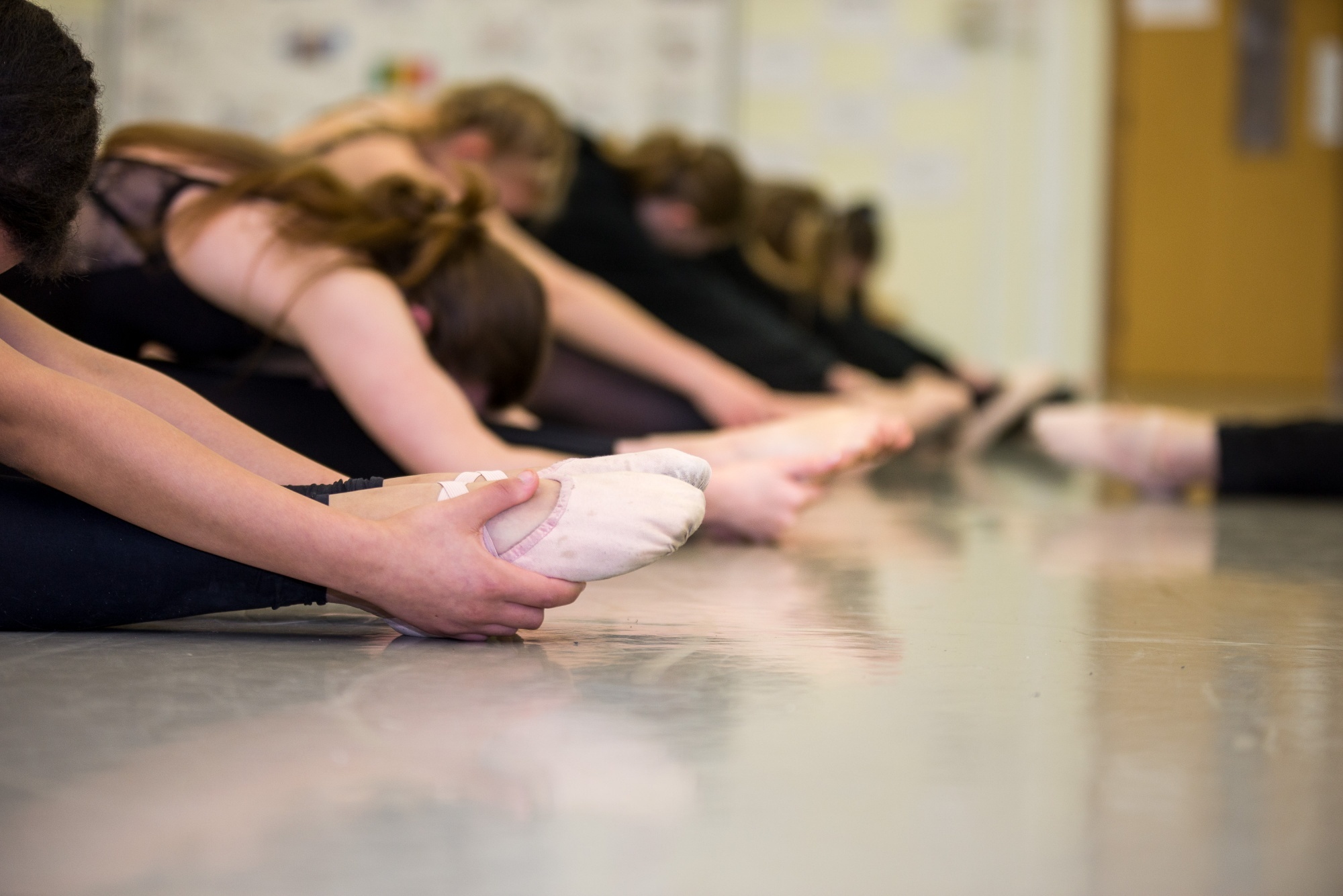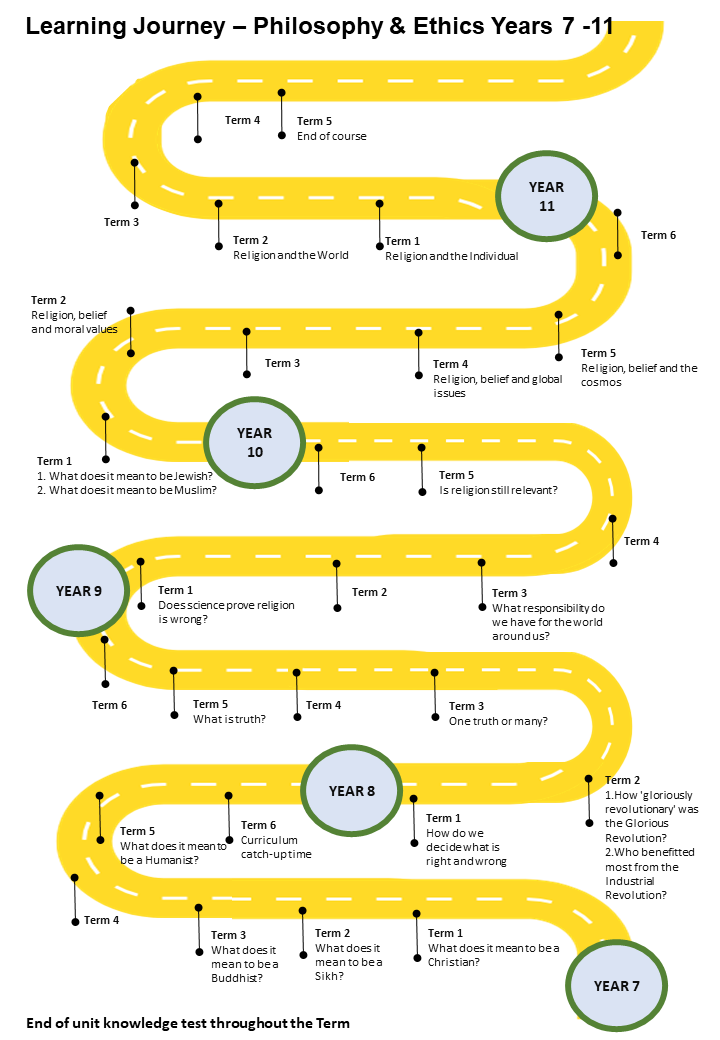Philosophy & Ethics (inc. Religious Education)
Philosophy and Ethics Curriculum Intent
The Philosophy and Ethics curriculum aims to give our students valuable insights into the diverse beliefs and opinions held by people today, in order to aid students’ own personal development and to support an understanding of the spiritual, moral, social and cultural questions that surface again and again in their lives. The study of Philosophy and Ethics encourages our students to explore and challenge their assumptions about what we are, how we think, and the nature of the world around us. At Key Stage 3, we build foundational knowledge of the core beliefs of Christianity, Sikhi, Buddhism and Humanism, before exploring how those beliefs influence worldviews on a range of philosophical and ethical questions. At Key Stage 4, we examine the core beliefs of Islam and Judaism, subsequently deepening our students’ understanding by analysing the significance of religion and worldviews in the modern world. At Key Stage 5, our students have the opportunity to develop their understanding of some of the most keenly debated philosophical and ethical issues in the world today, and to contribute their own views to those debates. Across all stages, we nurture well-rounded individuals who challenge stereotypes, promote cohesion and reject extremism. Above all, the Philosophy and Ethics curriculum encourages our students to value both themselves and the communities in which they live.
Philosophy & Ethics Department Ethos
At the heart of the Philosophy and Ethics Department lies a deep commitment to fostering a community grounded in empathy and respect. These guiding principles shape our mission to create an inclusive and nurturing space where all students feel seen and supported. This foundation enables us to inspire and empower learners to thrive with assurance as they progress through their educational path.
Engaged at Key Stage 3: Our Key Stage 3 Philosophy and Ethics curriculum is designed to spark curiosity, encourage critical thinking, and actively engage students in exploring some of life’s most profound questions. Through thought-provoking discussions, real-world case studies, and creative learning experiences, we aim to make philosophy and ethics relevant and meaningful to our students. By presenting diverse viewpoints and contemporary ethical dilemmas, we invite students to form and articulate their own ideas while respecting others.
Independent at Key Stage 4: At Key Stage 4, our Philosophy and Ethics curriculum is designed to cultivate intellectual independence and personal responsibility in our students. We encourage learners to think for themselves, question assumptions, and engage critically with complex philosophical and ethical issues. Through structured debate, extended writing, and reflective enquiry, students develop the confidence to form, defend, and refine their own viewpoints. Our curriculum empowers them to take ownership of their learning, fostering independent research skills and thoughtful self-expression. By promoting autonomy in thought and action, we prepare students not only for academic success, but for thoughtful engagement with the moral challenges of modern life.
Exemplary at Key Stage 5: At Key Stage 5, our Philosophy and Ethics curriculum is designed to develop exemplary students—independent, intellectually curious, and ethically reflective young adults. We aim to cultivate high-level critical thinkers who can engage with complex philosophical arguments, analyse ethical theories with precision, and articulate their views with clarity and depth.
Careers in philosophy & ethics
Careers in Philosophy and Ethics
- Philosophy and Ethics Teacher: Teaching Philosophy and Ethics in schools, from primary to secondary levels, is a primary career path.
- Chaplain: Providing spiritual guidance and support in various settings, including hospitals, schools, and universities.
- Religious Leader: Serving as a pastor, priest, rabbi, or similar role within a religious community.
- Higher Education Lecturer: Teaching Philosophy and Ethics at universities or colleges.
- Missionary: Working to spread religious beliefs and provide services in different cultures.
- Campus Religious Coordinator: Organising and coordinating religious activities and programs on university campuses.
Careers using Philosophy and Ethics
- Social Worker/Counsellor: Philosophy and Ethics studies can provide valuable insights into human behaviour, ethics, and social issues, making graduates well-suited for social work and counselling roles.
- Journalist/Media Professional: The ability to analyse complex texts, understand different perspectives, and communicate effectively are valuable in journalism.
- Human Rights Advocate/Victim's Advocate: Philosophy and Ethics can foster an understanding of ethical principles and human rights, making graduates well-equipped for these roles.
- Historian/Archivist: Philosophy and Ethics involves a study of religious history and the development of various beliefs, skills that can be applied to historical research and archival work.
- Legal Profession: Philosophy and Ethics graduates may find work in law firms, focusing on legal issues related to religion or religious institutions.
- Community Development Worker: Philosophy and Ethics can provide a foundation for understanding communities and developing programs that address social needs.
- Charity Fundraiser/Administrator: Philosophy and Ethics graduates can use their understanding of social issues and religious organisations to work in the charity sector.











